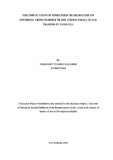| dc.description.abstract | This study was carried out to examine the implications of Simplified Trade Regime on informal cross-border trade among small scale trades in Namanga. The objectives of this study were to find out the level of uptake of simplified trade regime, understand how the level of uptake of simplified trade regime influenced informal cross-border trade and to find out the challenges and incentives of uptake of simplified trade regime.
This study used descriptive research design, in which both qualitative and quantitative methods were used to collect information. The study was conducted at Namanga border located between Kenya and Tanzania, whereby the unit of analysis was the small scale cross-border traders. Random sampling technique was used to select a sample size of 80 respondents to participate in the study. Both primary and secondary data was collected. Primary data was gathered using a semi-structured questionnaire and a key informant interview guide. Secondary data was gathered through reading relevant literature materials.
Validity and reliability of data was established through pilot test. Both qualitative and quantitative techniques were used in analysing the data. Data was presented in tables and charts. The study findings show that uptake of Simplified Trade Regime was at 25.76%, with a high frequency of usage of simplified trade regime among the adopters. Simplified Trade Regime has increased the volumes of goods traded, reduced cost of transactions and increased the level of security while crossing the border. Among the challenges faced by the respondents were high taxes, harassment, corruption and discrimination.
The study recommends a need for the government to create more awareness on the Simplified Trade Regime among traders. In addition, the government in collaboration with border enforcement officials need to address business malpractices such corruption, bribery and the smuggling of counterfeit goods. The Kenya Revenue Authority should recommend a reduction in the level of taxation to encourage as many traders as possible to participate in simplified trade regime. The government and the East Africa Community should provide more information through seminars, publications and civic education as well as increase the level of collaboration between Kenya and Tanzania in order to promote uptake of Simplified Trade Regime. | en_US |



